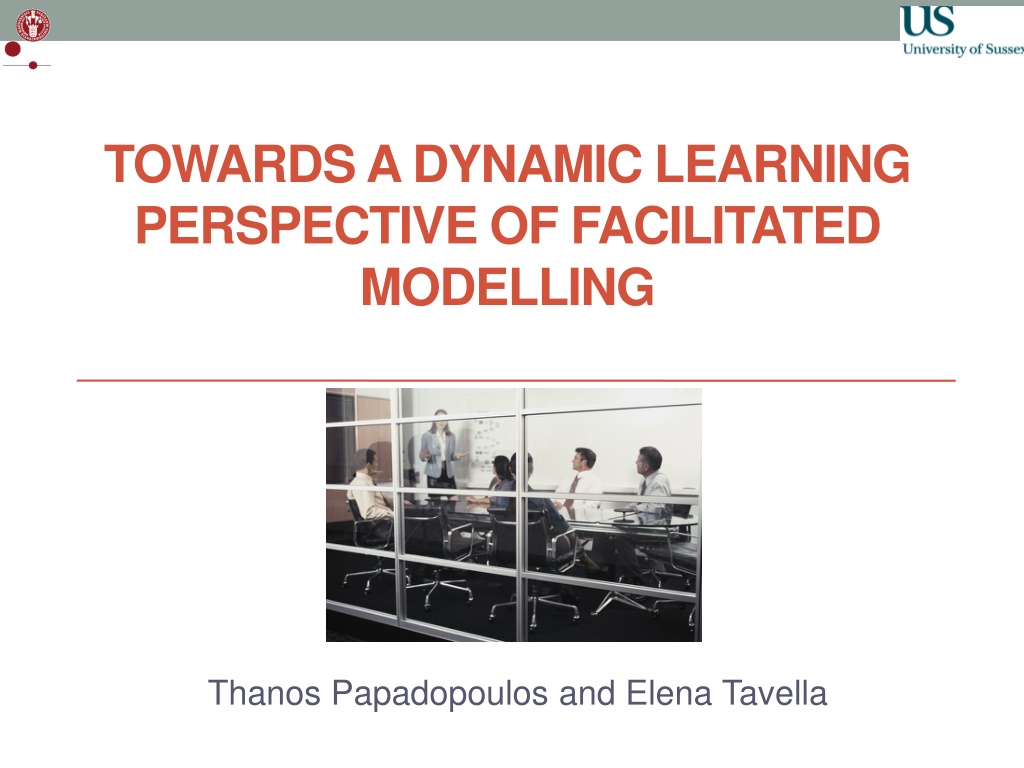
Dynamic Learning Perspective of Facilitated Modelling
Explore the dynamic learning perspective of facilitated modelling by Thanos Papadopoulos and Elena Tavella. From novice to expert facilitators, this research delves into the process of acquiring and developing skills in facilitated modelling approaches. Discover the strategies novices employ to transition into expert facilitators, bridging the gap through modules, case studies, and collaboration with experts. Uncover how successful facilitators differ from novices and the importance of learning and skill development in this field.
Download Presentation

Please find below an Image/Link to download the presentation.
The content on the website is provided AS IS for your information and personal use only. It may not be sold, licensed, or shared on other websites without obtaining consent from the author. If you encounter any issues during the download, it is possible that the publisher has removed the file from their server.
You are allowed to download the files provided on this website for personal or commercial use, subject to the condition that they are used lawfully. All files are the property of their respective owners.
The content on the website is provided AS IS for your information and personal use only. It may not be sold, licensed, or shared on other websites without obtaining consent from the author.
E N D
Presentation Transcript
TOWARDS A DYNAMIC LEARNING PERSPECTIVE OF FACILITATED MODELLING Thanos Papadopoulos and Elena Tavella
The starting point While much has been written about the theory and practice of using problem structuring methods there is little formal discussion of how individuals may effectively learn about their use (Keys, 2006: p. 822) 2 2
Facilitated Modelling (FM) extract Facilitator create Problem situation Model (representation) understand, make decisions, agree on actions Stakeholders analyse 3
Expert vs. Novice FM facilitation A successful facilitator is an expert (e.g. Ackermann, 1996; Franco and Montibeller, 2010) Novices have limited theoretical and practical knowledge and experience (Keys, 2006; Ackermann et al., 2010) Experts and novices behave differently (e.g. Keys, 2006)or not? (Tavella and Papadopoulos, 2013) 4
From novice to expert facilitators Novices learn through (means): Modules (seminars and lectures), case study approaches, laboratory settings and simulations, and group discussions and exercises (Ackermann, 2011; Carreras and Kaur, 2011; Hindle, 2011; Ormerod, 2013) Collaboration with experts in real-life interventions, apprenticeship, practice and experience (Ackermann, 1996; Keys, 2006; Kolfschoten et al, 2007; Ormerod, 2013) Scripts to elicit and transfer facilitation expertise to novices (Ackermann et al, 2010, 2011; Tavella and Papadopoulos, 2015) 5 5
Learning in the transit from novice to expert facilitators Acquire and develop skills knowledge of FM approaches and how they are applied in practice (Keys, 2006) and develop FM competence in Conducting Analysis (modelling) Designing and Managing Process Appreciating Context (specific to problem situation and stakeholder group) (Ormerod, 2013) 6
Research gap and question FM literature does: infer learning based on scholars experience with and reflection on teaching students and feedback by students (e.g. Ackermann, 2011; C rdoba-Pach n, 2011; Hindle, 2011; Ormerod, 2013) highlight the challenges in FM teaching and provides means for meeting them: scholars make inferences about students learning (Ormerod, 2013) FM literature does not: focus on learning, but mostly on teaching directly examine how facilitators learn in the transition from novices to experts How do facilitators learn what they learn? 7
On learning Learning is a process through which people acquire new knowledge, including skills, from direct experience, by observing the actions and consequences of others, and by studying codified sources such as books and papers.
Learning theories: Adult learning Making meaning from and reflecting on experience: understanding, appreciation, action (Mezirow, 1990) (i) meaning schemes that are habitual and implicit rules for interpretation (ii) meaning perspectives that involve the assimilation and transformation of new experience through the interpretation of old experience. Habits of expectation through socialization: within emotional relationships to parents, teachers and mentors. Habits of expectation are strengthened, extended and refined through experience, and used as dispositions or capabilities to make meaning of everyday situations.
People learn through Experiential learning: It involves prior knowledge and the process people adopt to acquire, assimilate, and organize new knowledge. Experience is represented and transformed into knowledge. Vicarious learning: learning by observing others behavior and actions Guides action in less familiar situations. Learn general rules and strategies to address new situations Applying rules and strategies adapted to match new and uncertain situations. Observing experts behaviors and actions; applying observations to their own situations. 10
Learning theories: Management Learning Situated Learning Theory (SLT) (Fox, 1997) Through active engagement in everyday, social situations such as communities of practice (Lave and Wenger, 1991) Apprenticeships that offer opportunities for reproducing tasks in routinized ways. Learn by Observing and by being absorbed in the culture of practice. Masters, finished products, and more advanced apprentices (Lave and Wenger, 1991). Interaction with the social and material aspects of the lived- in-world (Fox, 1997, p. 732).
Managerial learning from experience The intuitive approach: trust in learning as a natural , effortless process difficult to accept that there are advantages to be gained from making the process more explicit, deliberate and conscious, either for themselves or for other people The incidental approach: something out of the ordinary crops up The retrospective approach: drawing lessons from routine events and success; revisions and evaluation of experience alone or in conversations with others. The prospective approach: involves planning to learn before an experience takes place, things to be done are seen as opportunities to learn. planning to learn, implementing the plan, reviewing the plan and reaching conclusions. 12
Learning from critical events Critical learning events: Lead to shift in thinking and behaving Positive (e.g. collaboration with experts, successful workshops, observation of experts, and apprenticeships) or negative (e.g. failed workshops) Understand what happened and why these events were important in terms of learning and evolving from novice to expert 13
Methods Two-stages: Pilot Study: Semi-structured interviews with 7 FM experts (academics), 40 mins on average Transcription and data analysis under way Purposive sampling: select facilitators using different FM approaches Main study: Interviews with expert facilitators 14
Findings (1) On reflection: for instance I had in the past joint facilitation where I would facilitate with somebody else and when I do that, it is very likely then we will have a debrief session where I will say they did seem to take a hang of that or of that. I wouldn t say we sit down and say: we learnt 4 things from that, this, this, and this. It s never structured as that. It tends to be more, more ill-structured. (EF2) at the end I got some thoughts that quite often but a) the client is around, and (b) I m packing up kit and these days with work time is very finite, but I do try very hard to reflect on it within two days and make some notes. (EF3) 15
Findings (2) On CoP: I certainly write things down in papers it is interesting different research communities make this easier or more difficult. The OR community makes sharing those sort of insights not that easy because it tends to focus on the modelling aspect and minimise the human relations aspect (EF1) No no I don t keep notes at all no I keep a mental note like don t do that again , but no I don t have notes...I see every facilitation as being very different mainly becase the facilitation is about what the group of stakeholders want to get out of it rather than what I want to get out of it so things may go to a direction I may not have chosen, and I am not too bothered about that (EF2) 16
Findings (3) On apprenticeship (vicarious learning) This was something where I had decided to take the role of the facilitator because this had worked for this particular problem. So there were no other facilitators involved and nor was I drawn on anyone else s facilitative skills that no. (EF2) No, only once actually, and that was interesting, actually.. I was a backup facilitator , I was watching him doing his bit and I actually felt really disempowered because I really didn t know much about way he was doing things. He was obviously very confident as a facilitator... Interestingly the main learning I had was not by him although I learnt a couple of new tricks from him the things I learnt were mostly by my own intentions so intuitively that was informed by my own thinking (EF1) 17
Findings (4) On apprenticeship ( continued) I was doing it with a lot of the time at the beginning so you are watching and learning you know. I am interested in your comment about reading books. Ithink you can, but I think you learn hell of a lot more in an apprenticeship. And for me the very interesting point is when the apprentice and the master seized to be and became evens because style of facilitation is so significant I cannot and will not facilitate as him and he could or would not facilitate like me. Together though we compliment each other The more you work with somebody people say you know what to do..no.. You learn heuristics you learn patterns, we learn shortcuts.. (EF3) 18
Findings (5) Need for practice-based approaches to learning: I have realised that what s in the books and what s in the practice are really quite distinct. Also the realisation that came out of that regarding the importance of emotional dynamics, how to negotiate the remit of a project (EF1) The learning is fairly intuitive in the sense that you can hear I think the theorising about it helps solidify the language and explain what you are doing, but I think it s led by the practice primarily, although it s always a chicken and egg thing when you are trying out the methods, it creates the need for new skills I tend to think that most of the work I am doing in terms of managing the human relation side of things is very intuitive and has roots going back to the work I did (EF4) 19
Findings (6) The suprprising factor in practice based learning and CLEs: I can think for instance of experiences that surprised me in the direction it took so I remember facilitating one group I knew nothing at all about the domain so it was a large MNC, they had one particular problem, we talked about ways we could approach this particular problem and by that I mean I identified for them ways to help them overcome the problem as soon as we did the preliminary problem structuring, they started to get excited about things they could see from the way the problem had been structured (EF5) 20
Findings (7) Improvisation vs script-based approach to learning (retrospective vs. prospective aspect) We have to be careful here because this is how I (emphasis) work I do loads of improvisation otherwise if you go there with a script rather than with an improvisation you will be the dominant force and you are just meant to be facilitating rather than guiding for an outcome I have what I call a script.. I am looking for deliverables and products. There is a lot of design upfront 21
Discussion so far Learning views Findings Experiential Intuitive Incidental Retrospective Prospective Vicarious Apprenticeship Critical Learning Events (CLEs) Contrasting views Contrasting views No single theory can explain facilitation learning Practice-based view 22
Conclusion How do facilitators learn? Learning cannot be explained using just one theory Need for an alternative theory of learning 23






















